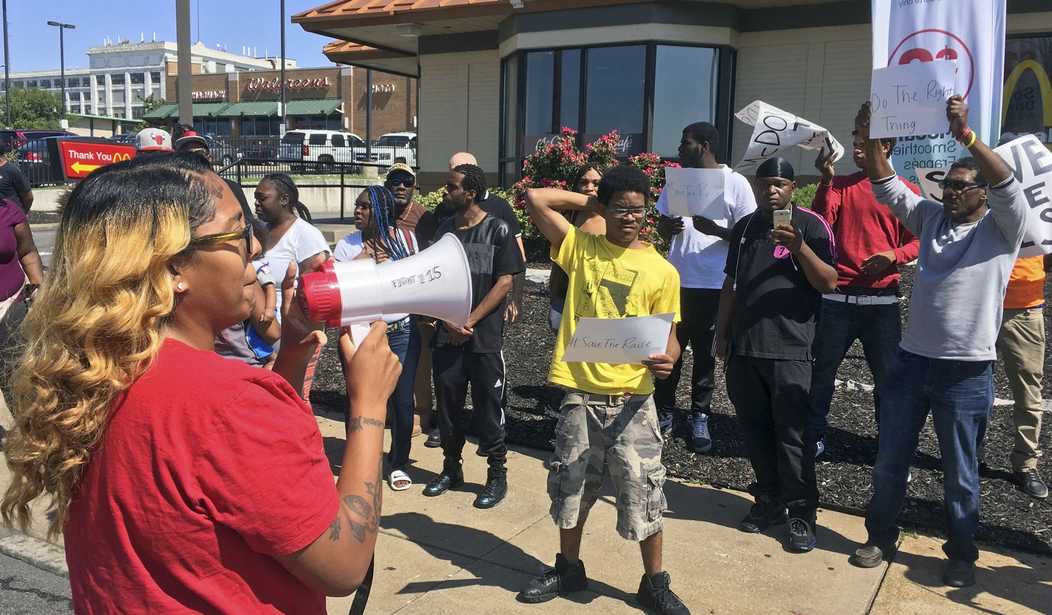Editor's Note: This piece was authored by Young Voices contributor Ethan Lamb.
Last week, House Democrats passed a bill that would raise the minimum wage to $15 an hour. Of course, this was done primarily for show since the Republican Senate will assuredly block it. But there won’t always be a Republican Senate and this kind of legislation will undoubtedly show up again — so it’s worth understanding what the real-life consequences would be if it passed. After all, there’d be quite a few.
Supporters of the increased minimum wage have cleverly framed the debate around whether minimum wage workers are deserving of a “living wage” (the implication being that any pushback must be motivated by a lack of empathy). As a result, people anxious to rally around the needy among us are pushing for the Senate to bend the knee. But they won't, because the economic arguments for the legislation simply don't make sense.
The oft-repeated line of debate from Democrats insists that a higher minimum wage would mean increased take-home pay, and that that pay increase would presumably boost aggregate demand for goods and services enough to offset the increased cost of labor. At least, that’s what former Secretary of Labor turned Twitter-economist Robert Reich says. The same goes for Democratic presidential hopefuls Joe Biden and Pete Buttigieg. They’re all wrong.
In 2017, public policy expert Jacob Vigdor joined a group at the University of Washington and conducted a comprehensive study of the effect of Seattle’s initiative to raise the minimum wage to $15 an hour. Indeed, the wages of low-skilled workers did increase by 3 percent when the minimum wage rose to $13 — but the number of hours worked dropped by 9.4 percent. Accounting for the reduction in hours, the average employee would lose a net $125 a month.
In another recent study, the Cato Institute assessed the impact of minimum wage laws in Denmark. In Denmark, the minimum wage laws become applicable for workers once they turn 18 years old. The results revealed a 15 percent decrease in employment at age 18, indicating the causal impact of minimum wage laws on employment.
Recommended
The Congressional Budget Office even conducted a study on the expected outcome of a federal minimum wage increase to $15 an hour. Similar to results of the Seattle study, these results found that, while the wages of 17 million workers presently paid under $15 per hour would increase, up to 3.7 million jobs would be eliminated.
In short, people trying to enter the workforce, like the young or people changing career paths, would be hit the hardest. Inevitably, that would take a heavy toll on the economy. Indeed, in his study, Jacob Vigdor alluded to an increasing trend wherein a hike in the minimum wage would encourage business owners to reorient their business structure toward a more capital-intensive model — like many fast-food chains are already doing. Ultimately, while experienced workers may retain their jobs, the prospect of training new employees becomes increasingly unappealing as the cost of labor rises.
It goes without saying, but first jobs are necessary. Generally, they inculcate good habits and equip workers with the requisite skills to move onto more advanced work. Arbitrarily raising the minimum wage only makes these skills more difficult to acquire. Consequently, would-be workers could easily turn to illegal means to make money. In fact, the Employment Policies Institute found that minimum wage hikes corresponded with an increase in property crime arrests of young people in the 16-24 age bracket. Sure, it’s unlikely that there is a direct causal relationship between crime and minimum wage laws, but it doesn’t help the weak argument that minimum wage increases would reduce crime.
In short, a minimum wage increase to $15 per hour would have a disparate impact on low-skill workers — the exact group that proponents of this bill are trying to help. This bill, like many from the progressive wing of Congress, is governed by good intentions. But to ignore the facts about this legislation is to neglect their duty as legislators and advocates of the common good.
Ethan Lamb (@realethanlamb) is a Young Voices contributor and an incoming law student at Georgetown University.

























Join the conversation as a VIP Member